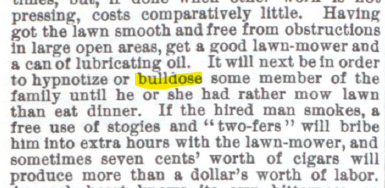In a Word: The Racist Origins of ‘Bulldozer’
Managing editor and logophile Andy Hollandbeck reveals the sometimes surprising roots of common English words and phrases. Remember: Etymology tells us where a word comes from, but not what it means today.
When you see the word bulldozer, you might conjure an image of a large yellow machine with caterpillar treads flattening everything before it with its steel-toothed blade. Or maybe your mind goes back to a smaller Tonka version of this mechanical behemoth that you played with as a child. Taken on its own, with no context, bulldozer might even call to mind some serene bovine scene, perhaps Ferdinand the Bull dozing among the daisies.
How jarring, then, to discover bulldozer’s horrible, violent beginnings.
Bulldozer (originally spelled bulldoser) first appeared in the run-up to the election of 1876. That was the final year of President Ulysses S. Grant’s second term in office, and he had unexpectedly declined to run for a third term. In his place, the Republican party put its support behind Ohio Governor and former U.S. Representative Rutherford B. Hayes, while the Democratic candidate was New York Governor Samuel Tilden.
This was an important election. All the former Confederate states had returned to the Union, post-Civil War Reconstruction was ongoing, and this was the first presidential election in which African-American men could vote for someone who wasn’t Ulysses S. Grant. The outcome of the election of 1876 would shape the future of the South for years to come.
The former slave owners and secessionists in the South knew it, and they weren’t about to sit back and let the North and their former slaves usurp their power and privilege. Despite three new federal laws in 1870 and ’71 designed to protect Black Americans from violence and coercion at the polls, many were bulldosed into silence. Bulldose was a slang term derived from either “a dose fit for a bull” or “a dose of the bull” — the second being a reference to the bullwhip. Bulldosers used physical violence against Black voters either to keep them from the polls or to intimidate them into voting Democratic.
Going into the election, in five states — Alabama, Florida, Louisiana, Mississippi, and South Carolina — a majority of registered voters were African American. One would expect, in a fair election, that the Republican candidate would easily take these states. But after the votes were tallied, Tilden had won the popular vote in Alabama and Mississippi.
The results in the other three states were even more unexpected. After counting had finished, both parties claimed victory in those states. On election night, Tilden was the presumed winner with 184 electoral votes, 19 votes ahead of Hayes and 1 vote away from holding a majority.
The 20 electoral votes of these states (plus Oregon) remained undecided for months as first the two parties and then the two houses of Congress launched separate investigations. Democrats and the Democratic-controlled House committee accused the Republicans of ballot stuffing and coercion. Republicans and the Republican-controlled Senate committee accused the Democrats of the same.
In the end, the presidential election was decided behind closed doors. In what came to be called the Compromise of 1877, the Democrats conceded the remaining electoral votes to the Republicans, making Rutherford Hayes our 19th president, but in return, federal troops were to be removed from the South, essentially ending Reconstruction and returning power to the same men who had controlled the South during the Civil War.
Though violent intimidation at the polls certainly continued, Southern officials found new ways to suppress the Black vote, including Jim Crow laws and grandfather clauses. Bulldosing took on the wider meaning of “to coerce or restrain by use of force,” and it was ripe for a more literal use when large, seemingly unstoppable machines came on the scene.

The machine we think of as a bulldozer was invented in the early 1920s, and by the initial months of the Great Depression, we start to find the term bulldozer in writing, with that Z further obscuring the word’s origins. The violent, racist origin of bulldozer is one reason many people now use the term earth mover to describe these massive machines.
If you’d like to learn more about the election of 1876 — including commentary from the Post while the election results were in flux — read “The Worst Presidential Election in U.S. History.”
Featured image: Andrey Yurlov / Shutterstock